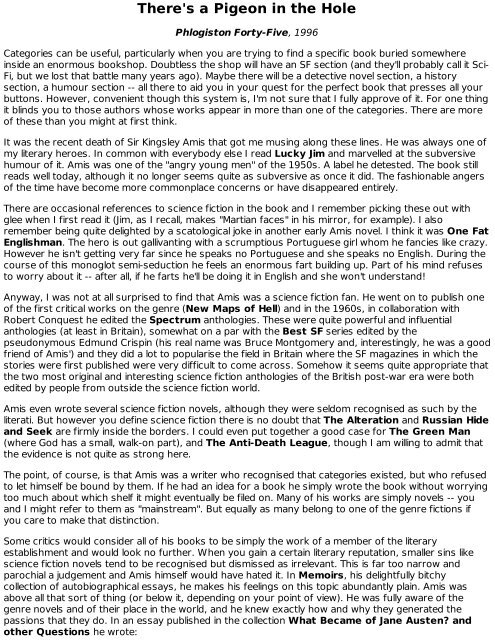Triffids Beard 2 - The Bearded Triffid
Triffids Beard 2 - The Bearded Triffid
Triffids Beard 2 - The Bearded Triffid
Create successful ePaper yourself
Turn your PDF publications into a flip-book with our unique Google optimized e-Paper software.
<strong>The</strong>re's a Pigeon in the Hole<br />
Phlogiston Forty-Five, 1996<br />
Categories can be useful, particularly when you are trying to find a specific book buried somewhere<br />
inside an enormous bookshop. Doubtless the shop will have an SF section (and they'll probably call it Sci-<br />
Fi, but we lost that battle many years ago). Maybe there will be a detective novel section, a history<br />
section, a humour section -- all there to aid you in your quest for the perfect book that presses all your<br />
buttons. However, convenient though this system is, I'm not sure that I fully approve of it. For one thing<br />
it blinds you to those authors whose works appear in more than one of the categories. <strong>The</strong>re are more<br />
of these than you might at first think.<br />
It was the recent death of Sir Kingsley Amis that got me musing along these lines. He was always one of<br />
my literary heroes. In common with everybody else I read Lucky Jim and marvelled at the subversive<br />
humour of it. Amis was one of the "angry young men" of the 1950s. A label he detested. <strong>The</strong> book still<br />
reads well today, although it no longer seems quite as subversive as once it did. <strong>The</strong> fashionable angers<br />
of the time have become more commonplace concerns or have disappeared entirely.<br />
<strong>The</strong>re are occasional references to science fiction in the book and I remember picking these out with<br />
glee when I first read it (Jim, as I recall, makes "Martian faces" in his mirror, for example). I also<br />
remember being quite delighted by a scatological joke in another early Amis novel. I think it was One Fat<br />
Englishman. <strong>The</strong> hero is out gallivanting with a scrumptious Portuguese girl whom he fancies like crazy.<br />
However he isn't getting very far since he speaks no Portuguese and she speaks no English. During the<br />
course of this monoglot semi-seduction he feels an enormous fart building up. Part of his mind refuses<br />
to worry about it -- after all, if he farts he'll be doing it in English and she won't understand!<br />
Anyway, I was not at all surprised to find that Amis was a science fiction fan. He went on to publish one<br />
of the first critical works on the genre (New Maps of Hell) and in the 1960s, in collaboration with<br />
Robert Conquest he edited the Spectrum anthologies. <strong>The</strong>se were quite powerful and influential<br />
anthologies (at least in Britain), somewhat on a par with the Best SF series edited by the<br />
pseudonymous Edmund Crispin (his real name was Bruce Montgomery and, interestingly, he was a good<br />
friend of Amis') and they did a lot to popularise the field in Britain where the SF magazines in which the<br />
stories were first published were very difficult to come across. Somehow it seems quite appropriate that<br />
the two most original and interesting science fiction anthologies of the British post-war era were both<br />
edited by people from outside the science fiction world.<br />
Amis even wrote several science fiction novels, although they were seldom recognised as such by the<br />
literati. But however you define science fiction there is no doubt that <strong>The</strong> Alteration and Russian Hide<br />
and Seek are firmly inside the borders. I could even put together a good case for <strong>The</strong> Green Man<br />
(where God has a small, walk-on part), and <strong>The</strong> Anti-Death League, though I am willing to admit that<br />
the evidence is not quite as strong here.<br />
<strong>The</strong> point, of course, is that Amis was a writer who recognised that categories existed, but who refused<br />
to let himself be bound by them. If he had an idea for a book he simply wrote the book without worrying<br />
too much about which shelf it might eventually be filed on. Many of his works are simply novels -- you<br />
and I might refer to them as "mainstream". But equally as many belong to one of the genre fictions if<br />
you care to make that distinction.<br />
Some critics would consider all of his books to be simply the work of a member of the literary<br />
establishment and would look no further. When you gain a certain literary reputation, smaller sins like<br />
science fiction novels tend to be recognised but dismissed as irrelevant. This is far too narrow and<br />
parochial a judgement and Amis himself would have hated it. In Memoirs, his delightfully bitchy<br />
collection of autobiographical essays, he makes his feelings on this topic abundantly plain. Amis was<br />
above all that sort of thing (or below it, depending on your point of view). He was fully aware of the<br />
genre novels and of their place in the world, and he knew exactly how and why they generated the<br />
passions that they do. In an essay published in the collection What Became of Jane Austen? and<br />
other Questions he wrote:


